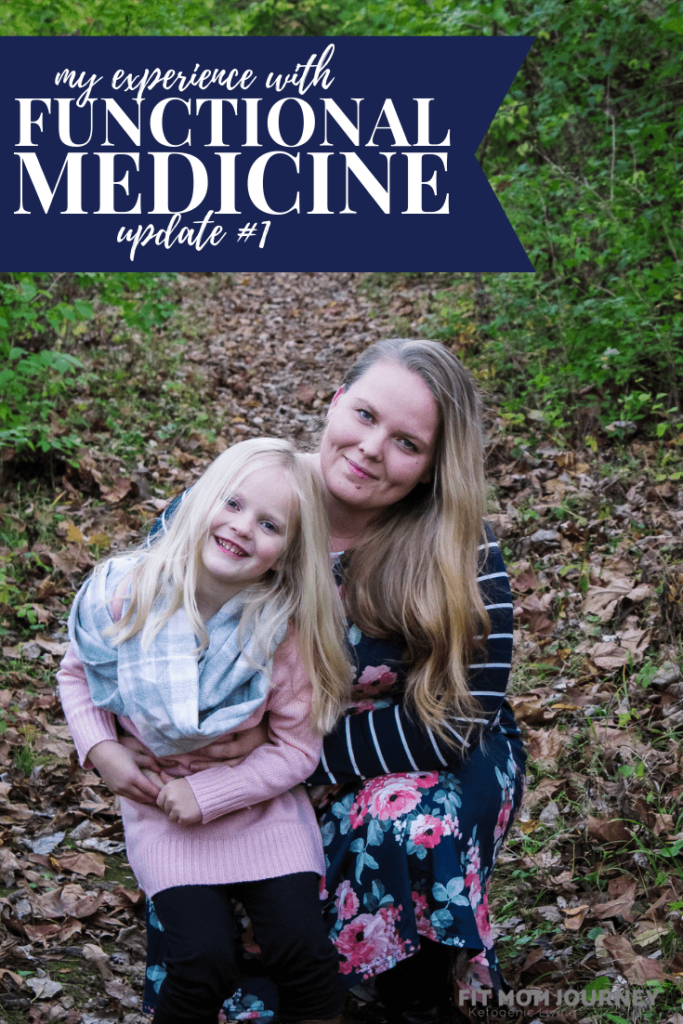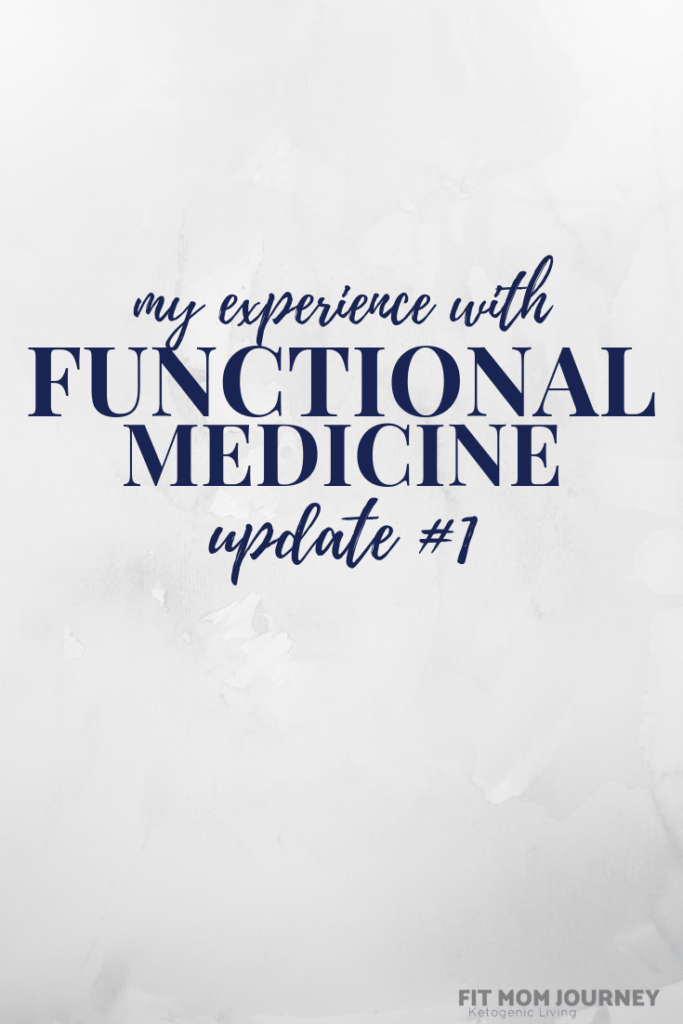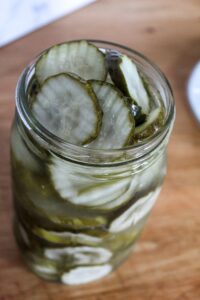
My Functional Medicine Experience:
Update #1
If you've read my story, then you may have heard me mention that I've struggled with weight most of my life, I've discovered that my hormones, minerals, and heavy metals are all completely out of whack, and that the Ketogenic Diet is the closest I've come to fixing all of these issues on my own.
In 60 Days of the Ketogenic Diet, I lost 23# and 19″, had more energy, more focus, slept better, and noticed significantly reduced cravings. You can read all about that HERE.
But then the good feelings stopped, and I couldn't figure out why. I tried doing carb-ups, supplementation, more exercise, less exercise, high protein, low protein, high calories, low calories, and more. Basically I was playing with the diet trying to get back the good feelings that I'd had before.
And none of it worked.
But for me, my absolute lowest point came when, during a workout program that was 12 weeks long, Not only was my weight still going up after 6 weeks, the inches over my entire body were going up (I mean, hello! I'm not gaining THAT much muscle) AND I gained nearly 6 inches around the lower point of my stomach.
Like, seriously?!?
Even thought I was doing everything right with diet and exercise, something inside of my body was going very wrong.
I could see it on the outside, and feel it on the inside.
And even though I really struggled with the idea of dropping hundreds of dollars on Functional Medicine (my insurance does not cover it at all), I talked to my husband, bit the bullet, and made an appointment at Frye Functional Health in hopes that they could help me – as well as dropped my OB/GYN who refused to believe that something was wrong with me.
So this article is to give you sort of a background of my story (as above), let you in on a LOT of info about Functional Medicine in case you're unfamiliar, and then walk you through where I am at in this whole process, what the doctor recommended, the science behind my specific protocol, and hopefully answer some questions.
Basically, I want this article to be chock-full of information.
And if you have a question?? Drop it in the comments, or shoot me an email!
I'll absolutely do my best to answer your question(s)!
Here is what this article will cover
- Why I'm doing this
- What Is Functional Medicine?
- How I chose my doctor
- Hair Test results
- Dietary Guidelines
- My new girl crush + workout suggestions
- Supplementation
Ready??
Let's go!
Why I'm Choosing Functional Medicine
It's been years since I've had a primary care physician. My insurance does not require me to have one, and as long as my numbers were normal at my yearly Gynecological appointment, I wasn't worried about it.
Why don't I have a PCM?
Basically, because I had 3 in the 3 years following my daughter's birth, and when I couldn't lose the weight to save my life, each and every one told me I needed to cut my calories down to 1,200 per day, exercise more, and eat low fat.
One doc even told me I was lazy, and that's why I wasn't losing weight.
And you better believe I dropped him like a hot potato.
Trying to address the weight/body composition issue on my own, I stumbled across the Trim Healthy Mama Plan, which is basically healthful carb cycling. And that plan worked – until it didn't. I floundered around trying to stay “on plan” for another year before discovering weight lifting and the Ketogenic Diet.
So, for the last 2 years I've been a pretty serious weight lifter, and have been Keto for about 1 year.
And initially, the weight lifting and Ketogenic Diet worked! All of the previous symptoms I was experiencing subsided for the most part, I started shedding body fat like a maniac, and felt amazing. What they say about Keto is true, from the amazing mental focus, energy levels, clear skin, and better sleep.
But then, my body went crazy, for no apparent reason.
All of the symptoms were back. And they were worse.
So, what were those symptoms?
- Excessive PMS (Like, I was crazy, I knew I was crazy, and I absolutely could not control the crazy no matter how hard I tried. I was never diagnosed, but I suspect PMDD)
- Excessive tiredness before my cycle.
- Weight gain, particularly in my hips, thighs, and midsection
- Really painful breasts around my period
- Heavy Menstrual cycles
- Reduced sex drive
- Depression
- Anxiety
- Insane Bloating
- Mood Swings
- Brain Fog
- Insomnia + Fatigue (a great combo, let me tell ya)
Now, at first, I brought these concerns up with my OB/GYN, and she suggested birth control, which I am VERY against for myself. If you take birth control, no judgement, but I do not believe in putting excess hormones into my body.
But, she wore me down, and eventually I landed on a Nexplanon in my arm, with a low dose of Progesterone, and for about 6 months I felt amazing!
Until I didn't…
Sensing a theme here?
In addition to all the above symptoms, I started having insanely heavy period.
Like passing clots the size of golf balls.
Unable to leave the house for a day or two because the flow was so heavy.
And I'm super sorry for those visuals, but that's what was happening to me, and I'll bet it's happening to some of you out there too.
After the symptoms came back, I went back to my OB/GYN and told her, and she tried to put me on even more birth control, refusing to address diet, or that it may be an internal hormonal issue that could be corrected naturally.
Ugh.
Then, for a while I tried to treat myself with supplements.
Extensive research told me that I was most likely experiencing Estrogen Dominance/Estrogen-Progesterone Imbalance.
I won't go into the details of the supplements I used to try and fix myself, because they're irrelevant, but after 4 months of those and not seeing a single difference – in fact, things were getting worse, I ended up deciding to go the Functional Medicine Route.
So, What is Functional Medicine?
Basically, Functional Medicine aims to educate patients about their body's physiology in order to empower them to take a more active and responsible role in restoring and maintaining their own health as well as the health of those around them.
Literally taken from my doctor's web page, ya'll, but I believe it sums it up well.
Functional Medicine takes a “whole body” approach to wellness, understanding that the entire body is connected, and that many diseases can be cured through diet, proper exercise, and strategic natural supplementation.
It might take longer than medicines that come from Big Pharma, but it's far healthier and better for the patient.
In addition, Functional Medicine seeks to inform and empower patients. A good Functional Medicine Physician will not “inform” you as to what to do. He/She will run tests, clearly explain those tests to you, and then suggest a plan of action with the reasons why.
And a really good one take a whole-food approach to health.
Here's one more truth bomb about Functional Medicine:
As physicians, we understand that although our patients may be diagnosed with the same conditions, the cause of that condition may vary. We acknowledge the biochemical individuality that we all possess and that each of us is unique with our own history, strengths, challenges, heredity, and epigenetic influences. Due to these foundational factors and the known interconnectedness of neurologic and organ function, our treatment approach is one that is holistic in nature and tailored to each individual; taking into consideration their personal needs, goals, and unique medical and physical condition.
How I Chose My Doctor
Let me be really frank here: I chose my doctor pretty fast. When I first landed on his clinic's web page, I saw this quote and was almost instantly ready to make an appointment:
“The doctor of the future will give no medication
but will interest his patients in the
care of the human frame, diet and the cause and
prevention of disease.”
-Thomas Edison
I do not suggest that you make a decision solely on a quote on a potential physician's website, BUT this single quote told me that this approach may be exactly what I was looking for.
Here's generally what to look for in Functional Medicine:
- They recommend a plant based organic often grain free diet.
- They don’t make grandiose promises.
- They specialize in complex chronic conditions such as autoimmune disease.
- They see themselves as your partner in health.
- They outline expectations so you know what to expect all along the way.
- They help you prioritize decisions such as testing and changes that need to be made.
- They make you feel comfortable and unjudged.
- They spend the time with you.
Here are potential red flags:
- The don’t seem to weigh the cost/benefit of tests or overly recommend expensive testing. For example, sometimes you can eliminate items from your diet as opposed to having testing done. Be sure to be honest about your financial limitations so they can work with you to find the best solution for your health and your wallet.
- They don’t think diet is very important.
- They recommend overly expensive and excessive supplements.
- They recommend harsh or dangerous detoxes.
- They promise you cures.
- They make you feel uncomfortable or don’t listen to you.
- They make you feel powerless or discouraged.
All of those above are things I looked into before choosing my doctor. I'm pretty sure I was every page on his website before making an appointment, read reviews, and of course research other physicians than the one I ultimately ended up with.
And, I'm happy to report that so far, my physician has exceeded my expectations. It has been a wonderful experience so far!
Let me be completely transparent here: I'm sharing my costs for this appointments, tests, and supplements. These are no way indicative of how much your Functional Medicine may cost, but you should be aware that I am paying 100% out of pocket for this, using funds from our FSA, which we fully fund each year.
My First Functional Medicine Appointment
My first appointment was actually a little over a month ago.
It cost $45, and lasted about 45 minutes. Before the appointment, I had to fill out a lot of paperwork, giving a detailed history, information, concerns, etc, which did not bother me one bit.
During the appointment, the doctor just sat down with me and got the most detailed medical and family history I think I have ever given. It was a bit uncomfortable, but that was not because of the doctor, it was simply because the issues I am dealing with are hard to talk about with anyone, including my husband. My doctor could not have done anything to make me feel my welcome, comfortable and un-judged.
In addition, he recommended spending $75 on a hair test, and he went into great detail explaining how it works, what it can tell us, and why this is his test of choice.
I went ahead and did that, and made an appointment for a month later, after the hair test came back.
What is a Hair Test? (Tissue Mineral Analysis)
So, this test that I paid $75 for, what is it? Why is it important? Why did I feel like it was worth spending money on?
Here is the information directly from my packet – I'll boil it down to simple terms after the quote:
“A hair tissue mineral analysis (HTMA) is a screening test that measures the levels of twenty-one mineral and toxic metals present in a sample of hair. Minerals are the ‘spark plugs' of life and play many important health related roles within the human body. Providing a ‘window into the cells,' hair makes an excellent biopsy material and reveals a clear record of mineral metabolism. Hair, like all other body tissues, contains minerals that are deposited as the hair grows. Although the hair is dead, the minerals remain as the hair continues to grow. The minerals and toxic metals are locked inside the hair during the growth stage as the body uses it for the storage and elimination of minerals.
A hair tissue mineral analysis reflects long term metabolic activity as it measures an average of mineral accumulation over a three month period of time. This is often an advantage as the test results are not influenced by day-to-day variations in body chemistry due to stress, diet, or other factors. Creating a blueprint of one's individual biochemistry, a hair tissue mineral analysis can assist in identifying mineral patterns which may be associated with stress, blood sugar, and carbohydrate imbalances, metabolic rate, biochemical energy productions, and glandular imbalances. Hair tissue mineral analysis is used worldwide to measure environmental contamination with toxic metals in the soil, plants and human and animal populations.”
That was a good bit of medical speak, so let's break this down:
Think about the rings on a tree when it gets cut down. Generally it has one ring for every year it has been growing. In learn years, those rings are skinny, and in great years those rings are thick.
Those rings are a record of everything that happened while the tree has been growing, and science is showing that we can detect changes in the soil, climate, rain levels, and other things by testing those individual rings.
The same is true with your hair, sort of.
As long as the hair is on your head, it basically immortalizes a record of what the mineral levels in your body were like.
And by testing those levels, a physician who practices Functional Medicine can use that record to see what is happening inside of your body with a great degree of accuracy, and the develop a holistic plan to make you feel your best, and even heal disease.
Make sense?
Hair Test Results
After all of that, how did my results come back?
Let me first say, when you get the results of this test, you don't just get a single-sheet printout with your results. Instead, you get about 30-pages with a significant portion of a page dedicated to each result, exactly what it means, how it affects your body, and other mineral results that could be affecting it/it could be affects.
It. Is. Thorough.
And since I absolutely love the science behind this stuff, I was thrilled.
The Nutrient Minerals
Here were my results:
- Calcium: optimal
- Magnesium: optimal
- Sodium: very low
- Potassium: very low
- Zinc & Chromium: significantly out of balance with each other
- Iron: low
- Copper: low (but iron and copper were in balance with each other)
- Manganese: low
- Selenium: low
- Phosphorus: optimal levels
Here's how this works;
The Zinc & Chromium allow insulin to get sugar into the cells, to be used for energy, cellular repair, etc. So my significant imbalance means things are not happening on a cellular level with the sugar in my blood like they need to. I am producing insulin just fine, but my body cannot use the sugar because my Zinc & Chromium are way out of whack with each other.
Since those are imbalanced….
It puts stress on my adrenals to handled the blood sugar, which significantly lowered my Sodium and Potassium Levels.
And since my adrenals have been completely worn down….
It affected my Pituitary Gland, which regularly Estrogen, Progesterone, Cortisol, and tons more hormones in the body, throwing them out of what, and affecting my Manganese levels.
And since my Pituitary Gland is having a really bad time of it….
This all landslid into Liver issues, shown in the form of my Iron and Copper levels been pretty low.
Isn't that the craziest thing how one little imbalance, left untreated, turned into a giant mudslide of issues?!?
Now, my Selenium was pretty low, but the doctor said all I need to do to correct is is by eating 2-4 Brazil nuts each day. Seriously. That's it. I was like “Really? Ok, I can handle that….”
My Phosphorus levels were optimal, which basically means I am eating enough protein. and if you follow me on Instagram, you know that's no issue for me!
The Toxic Metals
Beside the Nutrient Minerals, the test looked for Toxic Metal Loads, and any amount showing on the test was bad.
Here's what it looked for:
- Lead: none
- Mercury: low levels, but any showing up is bad
- Cadmium: none
- Arsenic: none
- Aluminum: moderate levels…not good at all….
The thing about Heavy Metals, is that I could have been born with these levels of toxic metals, since they can be passed from mother to fetus, or they could have built up through my lifetime. There is no way to know, but my supplement plan does address getting these metals out of my tissues and system.
Additional Minerals
Finally, the hair test looked for levels of other minerals that are not quite as essential, but very helpful for diagnosing and treatment.
- Nickel: low
- Cobalt: low
- Molybdenum: low
- Lithium: low
- Boron: none/N/A
We did not talk about these levels too much, but the doctor did say that we would be after the first round of supplements finishes.
The Rest of The Test
Now, this book gave me TONS more information, and I wanted to make sure to details some of the things it contains here, even if I don't do a deep dive into what exactly it is.
But, these are the interpretations of the minerals found within the hair test:
- Metabolism: Very slow
- Stress: Resistance stage (my body can no longer rid itself of stress, which was a big contributor in my stressed adrenals and imbalances above)
- Thyroid Function: low
- Adrenal Insufficiency: insufficient
- Copper: imbalanced
- Sugar & Carbohydrate Tolerance: normal
- Protein Synthesis: impaired
- Digestion: adequate
- Autonomic State (systems in the body that respond to stress and regulate hormones): unhealthy and exhausted
- Immune System: impaired
- Liver and Kidney Stress: definitely shows a trend towards liver and kidney stress
- Inflammation: inflammatory tendency
- Cell Permeability: decreased
That was a LOT of information, but I spent a good hour with the doctor going over the results, gaining knowledge and explanations for the treatment plan, stages of treatment, and what all of this means.
I boiled down what the doctor said in the Nutrient Minerals section above, and this is what the Dietary Guidelines and Supplementation plan were based upon.
The Dietary Guidelines
I should mention that the cost for the 2nd Functional Medicine visit was $35, and that included the consult with the doctor for the hair test as well as a consult with their in house dietitians (basically a nutritional consult)
So, I sat down with probably one of the most amazing human beings I've ever met. We quickly established that we follow a Paleo/Ketogenic diet and lifestyle, and that as long as I was following that 80%-90% of the time, there was no need to stress over diet.
Then, we got into exercise as well as when to eat, portions and other tips to help me reach my goals.
And ya'll, this woman's name is Billy Joe, and she is an amazing person. Not only is she not skinny – in fact, she is about my size – she is a cross-fit and Olympic Lifting Coach, so we talked a lot about the nutrition needed, as well as timing, workout hack and other stuff that help me hit my goals.
She was amazing, I officially have a girl crush, and here's what we discussed:
- Stick with low-carb/keto, placing an emphasis on whole foods. She was very understanding about the fact that we all get lazy because life gets busy, but just to get back on track as often as possible. We went over a few specifics like making sure I was eating as organic/grass-fed as possible, as well as healthy fats, no soy etc, but she was very quickly able to establish that I've got the nutrition pretty much nailed down.
- 4oz of protein over 2-3 hours. I didn't know this, but apparently the body can only digest 4oz of protein every 60 minutes, or 4oz of liquid every 60 minutes and I had no clue! So, she suggested continuing with the Intermittent Fasting, but eating every 2-3 hours with 3-4 ounces of protein each meal with allow my body to use the protein optimally and stop storing it with fat! (who knew!?!)
- No more than 16oz of protein each day, which works out to about 115g per day. Continue keeping my carbs low, and fill in the rest of my calories with fat.
- Do not go over 2,000 calories, but definitely eat at least 1600-1700 calories per day. My workouts are intense, so no 1200 calorie days for me. Always eat at lest 1600 calories, no matter what.
- Commit to fasted workouts. Admittedly, this one is hard for me, but Billie Joe encouraged me to slug 1/2 a tsp. of Baking Soda right before my workout to keep lactic acid from building up, and then eating directly after my workouts. She said that even though it's hard, commit to powering through for 15-20 minutes and I'll discover I have more energy. This will help me lose the body fat that I've been struggling so hard with.
- We also talked about some other random things like:
- How I might like the challenge of Crossfit. Definitely considering this.
- My lifting & running regimen, and some tweaks to make it more efficient
- How splitting up my protein will help me shred down
- How working out fasted will also help me shred down
- How to reduce my dairy intake. The don't specifically forbid dairy, but she commended me for the strides I've been making in reducing it in my diet.
- That I should have a “cheat' day once every month or two. Live a little! she said!
Basically, we sat in the office for an hour and talked about my goals, bonded over lifting weights, and she gave me some really awesome information.
I have to say, I was nervous about the nutritional part of it, because often people judge me for being plus-sized, not realizing that I have my diet LOCKED DOWN. The tips she gave me were incredibly actionable, fit with my lifestyle and the science behind the keto/paleo lifestyle I believe in, and was completely non-judgmental.
My Supplementation Protocol
One of the things my girl crush and I bonded over during the nutrition consult, was that our food is so much less nutrient dense than it was 50 years ago. Between the ground water, the soil, and growing practices, even if you eat 100% clean and organic, you're still getting less than 1/10th the nutrition that you would have 50 years ago.
And that's where strategic supplementation comes in.
My doctor put together a supplement plan designed to fix the most prominent issues first, so that we can diagnose and then treat the issues that are smaller, living underneath the big issues, but that are still important.
I will detail my supplements in my next post, because, quite frankly, this post is already a DOOZY, so for now, I'll wrap it up.
Honestly guys, my experience thus far with Functional Medicine has been….
The exact opposite of my experience at a traditional doctor's office
AND a complete breath of fresh air!
It literally feels like coming home to people who believe in you, and in what you're saying about your body not cooperating with your goals.
Stay tuned for my next functional medicine update, and make sure to subscribe so you don't miss any new posts!
xoxo,
Gretchen
Ready to give Keto a try? I changed my life with Keto and you can too! Sign up below right now to get started:

This post may contain affiliate links. See my disclosures for more information.





I’m sharing this information with my daughter as soon as possible. This sounds a lot like what she’s been experiencing…..
Thank you so much for sharing‼️
You’re so welcome! I’m sorry your daughter is going through this, but I hope shes able to find help 🙂
How can we contact your Functional Practitioner?
Hi Cathy! I am in the Edwarsville, IL area, but if you’re local too, Dr. Frye can be found at https://fryehealth.com/
Great post! I’m looking forward to following your journey. Thanks for posting the costs, I’ve been thinking about functional medicine for a while but was afraid it was not at all affordable. I’m going to look into it now. Thank you.
Thank you for reading! I was nervous too, and of course my costs were specific to my doctor, but I’m so glad you’re going to look into it!